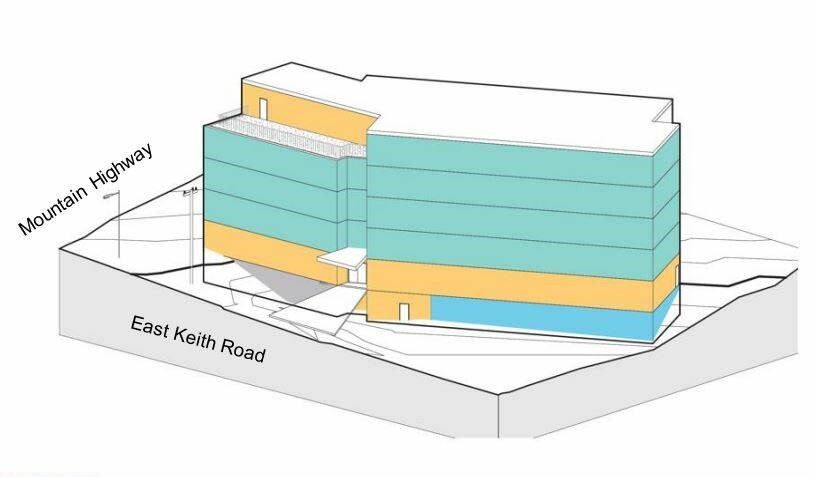What started on the evening of Nov. 21 as an opportunity for citizens to comment on a proposed supportive housing project has now become the longest public hearing in the history of the District of North Vancouver.
Spanning four evenings with sessions running over three-and-a-half hours each, mayor and council have heard from a total of 114 speakers, with an additional 40 instances of people speaking twice, thrice or more. Even by standards of the City of Vancouver, known for having some of the lengthiest council meetings in the country, a public hearing spanning five sessions is rare.
It began as people expressing points of view on a plan to build a six-storey, 65-unit studio apartment building at 1200 Keith Rd. But the hearing has increasingly become a forum to share tit-for-tat responses to past speakers, air defences of personal character and present ideas for alternative developments, one of which included a hybrid tricycle king-size bed.
As the speaker list spilled past the first two meetings on Nov. 21 and 22 into Dec. 7 and eventually Dec. 13, much of the meeting time was sucked up by trying to track down and connect to speakers online. By the fourth meeting, Mayor Mike Little warned that he was going to be more “aggressive” about telling repeat speakers not to repeat past statements.
Similar to the first two evenings, arguments in the latter two sessions included comments against the project, in which people cited concerns about the location of the project near a busy intersection, schools and child care, coupled with fears that the people living in the building would contribute to open drug use, increased crime and decreased property values in the area.
A significant majority of those who have written to council and spoken at the public hearing have been opposed to the project.
On the other hand, people speaking for the project spoke to the need to house the unhoused on the North Shore, how decision-making should be guided by compassion opposed to fear, and that evidence shows various costs associated with emergency care should go down where supportive services are available.
Questions from council answered
Between the back-and-forth over the merits and concerns about the project, staff and members of relevant organizations answered questions posed by council. Most of these were read out in the Dec. 7 meeting.
The first involved residents wanting to have more data references or recent research that supported previous responses from staff about the project. For that information, district senior planner Tamsin Guppy directed people to the ever-growing binder in council chambers, or the online version. She also pointed BC Housing’s digital research library.
After the public hearing is closed, Guppy said additional questions from the public could be put directly to her.
Next, there were questions about clarifying funding commitments.
From the capital side, $33 million in funding has been set aside by BC Housing to pay for housing the 60 people brought in to live temporary at the Travelodge site on Marine Drive, explained Naomi Brunemeyer, director of regional development. For operational funding, BC Housing estimated that $2.5 million would be committed annually for the 60-year lease, she added.
There is an additional $1.7 million in operational funding for five complex care beds coming from Vancouver Coastal Health.
BC Housing was then asked if the Residential Tenancy Act would be enforceable at the housing development. Brunemeyer replied that it would apply to all the units.
As for a breakdown of the tenants expected to live in the building, Brunemeyer said that BC Housing would strive to mirror demographics found in the 2023 homeless count.
“Those soft targets look something like 69 per cent male, 28 per cent female and three per cent of other gender identity. By age, we would say eight per cent for youth 19 to 24, around 70 per cent … would be 25 to 54, and 22 per cent would be seniors. If we break that down further, we would like to house a minimum of 33 per cent Indigenous which is reflective of our homeless counts,” she said.
Will visitors be allowed to bring drugs and alcohol into the building?
“Yes, they can,” Brunemeyer said. “Alcohol is a legal substance that people are able to bring into any residential building. And we do allow people to have their guests bring their drugs with them, hoping that instead of going out and using in the community, they would be using in the overdose prevention site.”
Another question concerned what the expected length of stay would be for someone in the supportive housing building.
There’s no specific length of stay for any of the beds, said Ira Roness, director of mental health and substance use North Shore for Vancouver Coastal Health.
“It’s really determinant on what the needs are of the individual. They can stay for lengthy periods of time, which is quite different than in a hospital,” he said. “This is housing. And some people are going to progress through and move out to either independent housing or other types of housing supports that we provide services to through Vancouver Coastal Health.”
Council is expected to continue the public hearing on Monday, Jan. 15.




